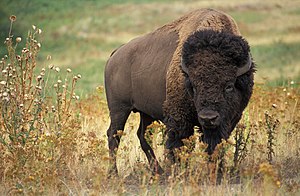Blog:Trophy Hunting Kills One Animal Every Three Minutes
Trophy Hunting Kills One Animal Every Three Minutes, Threatening Endangered Species and Climate Change Efforts
August 11, 2023
By Nicole Rojas
In a study posted last year, it was found that trophy hunters killed one animal every THREE minutes over the last decade.[1]

The study revealed:
- Included in the 1.7 million animals killed in the last decade, were elephants, lions and rhinos who are part of the Convention on International Trade in Endangered Species of Wild Fauna and Flora (CITES) protected species.
- Nearly 800 hunters won the ‘African Big 5’ prize for killing at least one elephant, lion, leopard, a black or white rhino, and a buffalo.
- Safari Club International awards a special prize to anyone who shoots more than 80 different African species.
- Trophy hunting undermines many facets of maintaining biodiversity around the globe at a time where many wildlife are endangered and being pushed towards extinction.
- Trophy hunting threatens the survival of species in many ways:
- Risk of local extinction of wildlife populations.[2]
- Population structure is then skewed to subadult males and females which reduces reproductive success.[3]
- Genetic erosion: where there is decreased genetic diversity and loss of resilience.[4]
- Destabilization of wildlife populations through the key loss of individuals who contain the critical social and ecological knowledge needed for the survival and reproduction.[5]
Endangered keystone species who are being hunted down for trophies are in fact doing more to support climate change than we are just by their sheer existence and everyday their numbers keep on dwindling.

The Intergovernmental Panel on Climate Change (IPCC) has reported we have a decade left to help turn back the clock on preventing even larger scale climate disasters and rewilding of endangered species like the elephant and wolf can help promote healthier ecosystems which results in a healthier planet for you and me.
According to an article published in the Nature Climate Change journal; “Rewilding nine wildlife species (African forest elephants, American bison, fish, gray wolves, musk oxen, sea otters, sharks, whales, and wildebeest) would contribute more than 95% of the annual requirement to achieve the global target of extracting 500 billion metric tons of carbon dioxide from the atmosphere by 2100. This in turn would help cap the global temperature rise at less than 1.5 degree Celsius.[6]
Many of the hunted wildlife are keystone species that actually support ecosystems. Keystone species are the blueprint to help keep our ecosystems balanced and intact. Saving them is a simple solution to help save our planet because humans benefit from healthy ecosystems as ecosystems provide us with healthy water, oxygen, and sequester carbon.
See also
About the author
About Wild For Change
Nicole Rojas is a passionate animal advocate and conservationist who has dedicated her life to being a voice for wildlife. She is the founder of Wild For Change, a platform that aims to bridge the gap between humans and nature and inspire positive change for the planet. She hosts the Wild For Change podcast, where she interviews gamechangers who are making a difference for animals and nature. Nicole has been involved in various campaigns and petitions to ban the sale and trade of wildlife parts, protect elephants in Botswana, and end trophy hunting imports of endangered species.
Nicole is a true animal lover who believes that all beings deserve respect and reverence. She is Wild For Change!
Wild For Change Official website
References
- ↑ One Animal Killed Every Three Minutes: Trophy Hunting is out of Control! Campaign to Ban Trophy Hunting
- ↑ Assessing the sustainability of African lion trophy hunting, with recommendations for policy Creel, S., M’soka, J., Droge, E., Rosenblatt, E., Becker, M.S. Matandiko, W. and Simpamba, T. (2016)
- ↑ Milner, J. M., Nilsen, E.B. and Andreassen, H.P.(2007). “Demographic side effects of selective hunting in ungulates and carnivores.” Conservation Biology 21(1): 36-47
- ↑ Genetic effects of harvest on wild animal populations.” Trends in ecology & evolution 23(6): 327-337 Allendorf, F.W., England, P.R., Luikart, G. Ritchie, P.A., and Ryman, N. (2008)
- ↑ Leadership in elephants: the adaptive value of age.” Proceedings of the Royal Society B: Biological Sciences 278(1722): 3270-3276 McComb, K., Shannon, G., Durant, S. M., Sayialel, K., Slotow, R., Poole, J. and Moss, C. (2011).
- ↑ Trophic rewilding can expand natural climate solutions. Nat. Clim. Chang. 13, 324–333 (2023). Schmitz, O.J., Sylvén, M., Atwood, T.B. et al.
Notes
| This page is part of the Animal Talk portal. The opinions expressed by guests, blog authors and interview hosts are their own. |
